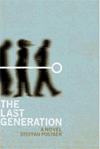The Letter from the Editor which heads up the May issue of GQ has little to do with advertising but certainly qualifies as a nasty morsel of popular culture. It’s also quite sad. The magazine’s Editor-in-Chief, Jim Nelson was dining at the famed New Orleans’ restaurant, Stella this past Mardi Gras and happened to be in “wine spitting” distance of Nicolas Cage while he was in the midst of a notorious alcohol-induced blackout. Most of us are familiar with Cage’s meltdown, having heard the story here there and everywhere. Likely, we all attributed it to another “moment” in the controversial and bizarre star’s repertoire. Known for playing myriad odd, terrible and often wonderful characters (Raising Arizona, Vampire’s Kiss, Ghost Rider, Bad Lieutenant: Port of Call New Orleans, among many others), here he seemed to be channeling Charlie Sheen and then some.

“Leaving Las Vegas” no longer an act.
In any event, the GQ editor witnessed the entire debacle and elected to make it the subject of his forward to the magazine. Wise choice. As I said, it’s a scintillating piece.
But as I also said, it’s a sad one. But sadness is not the tone Nelson reported. Like most observers of popular culture, he took aim at the falling star and gave us a blow by blow. I don’t begrudge the writer for doing so. That’s his job. Sort of.
But there’s a crucial piece missing from the tawdry tale that might have actually provided real learning to the reader. In describing Cage’s condition, I intended the word “blackout” as noun more than adjective. Nicolas Cage was having an alcoholic blackout. In this condition the man no longer is cognizant, let alone in control. The symptoms were textbook. Yet, I’ll bet many of you are only aware of the obvious ones: lewdness, lechery and violence. Those lovely defects are what got Mr. Cage arrested, no small feat during Mardi Gras.
But what I found eerily fascinating were some of the other defects Cage manifested during his downward spiral. Nelson reports that the actor had befriended a couple at the bar and had insisted on buying them drinks. And not just any drinks but some of the most expensive wines on Stella’s impressive list. In recovery programs, they call this “grandiosity.” You say Cage is a millionaire movie star (actually, he’s bankrupt) but I’m telling you even garden variety drunks can and do display this defect. All of the time. It’s a marker for alcoholism.
Poignantly, prior to his arrest (just after breaking an interior window), Cage bellows to the embarrassed crowd: “You love me!” I say poignantly because now his grandiosity has degraded into self-pity and self-destruction. As Nelson pointed out in his article, chances are many of the patrons did, in fact, once love him, or at least got a kick out of him. But not anymore. Now they merely wanted him gone. Nicolas cage had hit a “bottom,” another recovery term that requires no defining. For Cage, that meant oblivion and a jail cell, not necessarily in that order.

Call it what it is: Alcoholism
Look, I don’t pretend to really care about Nicolas Cage or his personal demons. However, I do feel that every once in a while, when we’re given these all-too-similar stories about falling stars (Charlie Sheen, Lindsay Lohan, Courtney Love, etc…), that we are given the full story. It justifies none of their behavior but it might help someone else understand what’s going on or maybe even get better (themselves), if they’re sick, like Nicolas Cage clearly was and is. By not doing so, I feel the media (and society as a whole) is in as much denial about alcoholism and addiction at the pour souls they are covering.




 The Happy Soul Industry
The Happy Soul Industry The Last Generation
The Last Generation